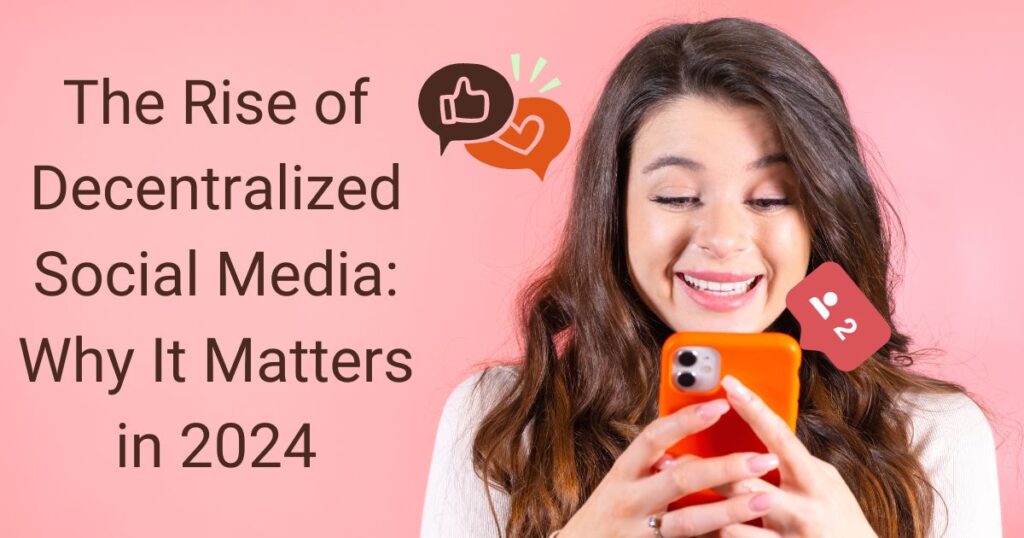- Home
- About Us
- Services
- IT, Digital & technologies
- Non- IT
- Staffing Service
- - Executive Search
- - Project Based Hiring
- - Direct Hire
- - Contract Hiring
- Contingent Staffing
- Outsourcing
- PF ESI Management
- Salary TDS Management
- Labour Compliance Outsourcing
- Compliance Management
Workforce Solution
Payroll & Compliance Management
BGV (Background Verification)
- Solution
- Blog
- Career Zone
- Contact Us
The Rise of Decentralized Social Media: Why It Matters in 2024

The Rise of Decentralized Social Media: Why It Matters in 2024
In the age of digital connectivity, social media has become an integral part of our daily lives. Platforms like Facebook, Twitter, and Instagram have dominated the landscape, connecting billions of people worldwide. However, as concerns about privacy, data ownership, and censorship grow, a new trend is emerging: decentralized social media.
What is Decentralized Social Media?
Decentralized social media refers to platforms that operate on a network of independent servers rather than relying on a single, central authority. Unlike traditional social media, controlled by centralized companies, decentralized platforms often leverage blockchain technology or distributed networks. This structure allows users to have more control over their data and content, fostering a more transparent and secure online experience.
Key Features of Decentralized Social Media:
- Data Ownership: Users retain full ownership of their data, deciding how it’s used and shared. This contrasts with centralized platforms, where user data is often exploited for advertising and profit.
- Privacy and Security: Decentralized platforms enhance privacy by not storing data on a single server vulnerable to hacks or breaches.
- Censorship Resistance: With no single authority controlling the content, decentralized platforms reduce the risk of censorship and promote free expression.
- Transparency: Many decentralized platforms are open-source, allowing users to inspect and trust the platform’s code and governance.
Examples of Decentralized Social Media Platforms:
- Mastodon: An open-source network of servers offering a Twitter-like experience.
- Steemit: A blockchain-based platform where users earn cryptocurrency for creating and curating content.
- Peepeth: A decentralized alternative to Twitter, built on the Ethereum blockchain.
The Importance of Decentralized Social Media in 2024
As of 2024, concerns about data privacy, censorship, and the monopolistic control of big tech companies have reached new heights. A recent survey revealed that 73% of internet users are worried about their online privacy, while 56% believe social media platforms have too much control over the content they see.
Why Should You Consider Using Decentralized Social Media?
- Empowerment: Decentralized platforms give power back to the users, allowing them to control their content and data. This empowerment is crucial in an era where personal information is a valuable commodity.
- Free Expression: Decentralized platforms offer a safe space for diverse opinions and ideas, free from the influence of a central authority that might censor controversial or dissenting voices.
- Transparency and Trust: With open-source code and transparent governance, users can trust that the platform operates with integrity and aligns with their values.
- Monetization Opportunities: Some decentralized platforms offer unique monetization opportunities, such as earning cryptocurrency through content creation, as seen on Steemit.
The Future of Social Media
The shift towards decentralized social media is more than just a trend; it’s a movement towards a more democratic and user-centric internet. As traditional social media platforms face increasing scrutiny and regulation, decentralized alternatives provide a fresh perspective on what social media can and should be.
In conclusion, decentralized social media offers a promising solution to many issues plaguing traditional platforms. By prioritizing data ownership, privacy, and free expression, these platforms are paving the way for a more open and equitable online space. As we move forward, it’s essential to explore these alternatives and consider how they can enrich our digital lives.

